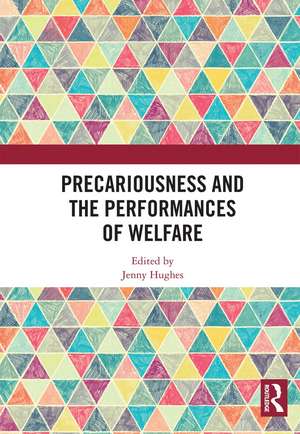Precariousness and the Performances of Welfare
Editat de Jenny Hughesen Limba Engleză Paperback – 18 dec 2020
Precariousness and the Performances of Welfare brings together an international group of artists, activists and scholars to explore precarity in the contexts of applied and socially engaged theatre. The policy of austerity pursued by governments across the global North following the financial crisis of 2008 has renewed interest in issues of poverty, economic inequality and social justice. Emerging from European contexts of activism and scholarship, ‘precarity’ has become a shorthand term for the permanently insecure conditions of life under neoliberal capitalism and its associated stripping back of social welfare protections. This collection explores a range of theatre practice, including activist theatres, theatre and health projects, the community work of regional theatres, arts-led social care initiatives, people’s theatres and youth arts programmes. Comprising full-length chapters and shorter pieces, the collection offers new perspectives on social theatre projects as creative occasions of occupation that generate a sense of security in a precarious world.
This book was originally published as a special issue of RiDE: The Journal of Applied Theatre and Performance.
Preț: 251.99 lei
Preț vechi: 303.01 lei
-17% Nou
Puncte Express: 378
Preț estimativ în valută:
48.22€ • 50.06$ • 40.21£
48.22€ • 50.06$ • 40.21£
Carte tipărită la comandă
Livrare economică 25 martie-08 aprilie
Preluare comenzi: 021 569.72.76
Specificații
ISBN-13: 9780367671204
ISBN-10: 0367671204
Pagini: 202
Dimensiuni: 174 x 246 mm
Greutate: 0.37 kg
Ediția:1
Editura: Taylor & Francis
Colecția Routledge
Locul publicării:Oxford, United Kingdom
ISBN-10: 0367671204
Pagini: 202
Dimensiuni: 174 x 246 mm
Greutate: 0.37 kg
Ediția:1
Editura: Taylor & Francis
Colecția Routledge
Locul publicării:Oxford, United Kingdom
Public țintă
Postgraduate and UndergraduateCuprins
Introduction - Theatre and the social factory 1. Performing to understand: cultural wealth, precarity, and shelter-dwelling youth 2. ‘Think differently, get creative’: producing precarity in India’s corporate theater culture industry 3. Birmingham Rep, youth and community, and the products and possibilities of precarity 4. Subverting ableist discourses as an exercise in precarity: a Zimbabwean case study 5. Hard labour and punitive welfare: the unemployed body at work in participatory performance 6. Notes on a theatre commons: Common Wealth’s The Deal Versus the People (2015) 7. Finding a concrete utopia in the dystopia of a ‘sub-city’ 8. Rethinking fragile landscapes during the Greek crisis: precarious aesthetics and methodologies in Athenian dance performances 9. Relocating precarity and resiliency within Montreal: the Artists’ Bloc of the Immigrant Workers’ Centre 10. Teatro Valle Occupato: protesting, occupying and making art in contemporary Italy 11. Compassion is dissent 12. In the Limelight: enthusiasm, commitment and need 13. The resilience web 14. Precariousness and groundedness in arts in mental health 15. ‘Days in the Bay’: a short performance devised by the Tiger’s Bay Men’s Group and inspired by the changing streetscape of North Belfast 16. On ‘A Piece for Two (Lovers)’ – an unrehearsed performance piece 17. A people’s theatre for Brighton – an interview with Naomi Alexander
Notă biografică
Jenny Hughes is a Senior Lecturer in Drama at the University of Manchester, UK. She is Points and Practices editor of RiDE: The Journal of Applied Theatre and Performance and publishes in the areas of theatre and economic justice; performance and war; activist performance; and aspects of applied theatre, especially theatre with young people living with risk and the histories of socially engaged theatre. Her recent publications include Critical Perspectives on Applied Theatre (with Helen Nicholson, 2016) and a special issue of Contemporary Theatre Review edited with Simon Parry, ‘Theatre, Performance and Activism’ (2015).
Descriere
This book explores precarity in the contexts of theatre practice, theatre and health projects, the community work of regional theatres, arts-led social care initiatives, people’s theatres and youth arts programmes. This book was originally published as a special issue of RiDE: The Journal of Applied Theatre and Performance.
